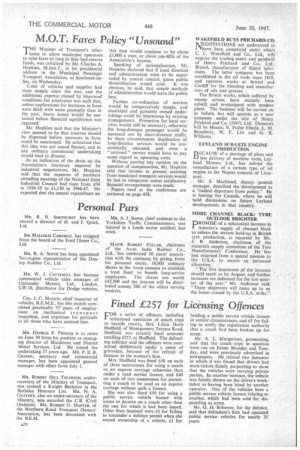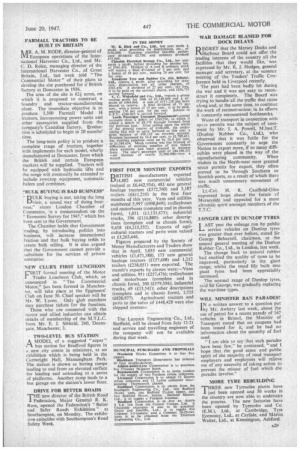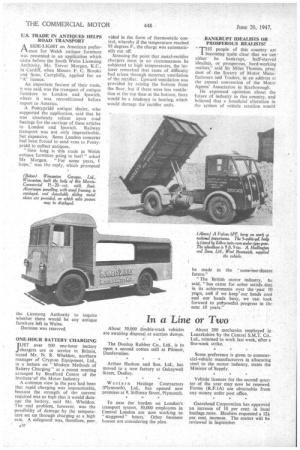M 0.T. Fares Policy "Unsound"
Page 30

Page 31

Page 32

If you've noticed an error in this article please click here to report it so we can fix it.
THE Minister of Transport's reluc tance to allow municipal operators to raise fares so long as they had reserve funds, was criticized by Mr. Charles A. Hopkins, Minst.T., in his presidential address to the Municipal Passenger Transport Association, at Southend-onSea, on Wednesday.
Costs of vehicles and supplies had risen steeply since the war, and the additional expense caused by improved conditions for employees was such that, unless applications for increases in fares were dealt with more promptly than in the past, heavy losses would be sustained before financial equilibrium was regained.
Mr. Hopkins said that the Minister's view seemed to be that reserves should be dispersed before increases in fares could be sanctioned. He submitted that this idea was not sound finance, and in any ordinary commercial undertaking would lead to disaster.
As an indication of the drain on the Association's resources imposed by industrial negotiations, Mr. Hopkins said that the expenses of members• attending meetings of the National Joint Industrial Council had risen from £34 in 1934-35 to £1,130 in 1946-47. He expected that the annual expenditure on
this item would continue to be about £1,000 a year, or about one-fifth of the Association's income, Speaking of nationalization, Mr. Hopkins declared that if local direction and administration were to be superseded by central control, grave public dissatisfaction would arise. It was obvious, he said, that simple methods of administration would serve the public best.
Further co-ordination of services would be comparatively simple, and municipal and privately owned undertakings could be interwoven by existing managements. Protection for local services would still be necessary, otherwise the long-distance passenger would be squeezed out by short-distance traffic. In these circumstances, duplication of long-distance services would be economically unsound, and even a " national " service would have to pay some regard to operating costs.
. Without passing any opinion on the question of compensation, Mr. Hopkins said that income at present accruing from municipal transport services would be lost to ratepayers unless satisfactory financial arrangements were made.
Papers read at the conference are reviewed on page 458.
WAKEFIELD BUYS PRICHARD. CO. MEGOTIATIONS are understood to 1 have been completed. under .which C. C. Wakefield and. Co., Ltd., will acquire the trading assets and goodwill of Henry Prichard and Co., Ltd., Bristol, manufacturer of Ristol lubricants. The latter 'company has been established in the oil trade since 1818. and operates works at Bristol and Cardiff for the blending and manufacture of oils and greases.
The Bristol works, which suffered by enemy action, have recently been rebuilt and re-equipped with modern plant. The business will be carried oh as before, but will operate as a new company under the title of Henry Prichard and Co. (1947), Ltd. Directors will he Messrs. V. Fuller Eberle, L. M. Broadway, W. F. List and G. R. Williams.
LEYLAND SUB-LETS ENGINE PRODUCTION •
BECAUSE of a shortage of plant and late delivery of machine tools, Leyland Motors, Ltd., has sub-let the manufacture of a certain type of oil • engine to the Napier concern of Liverpool.
Mr. S. Markland. deputy general manager, described the development as a "radical departure from policy." He is leaving for Canada, where he will hold discussions on future Leyland developments in that country.
MORE CHANNEL BLACK: TYRE OUTLOOK BRIGHTER
DROMLSE of a substantial increase in
America's supply of channel black to relieve the serious hold-up in British tyre production, is reported by Mr. J. B. Anderson, chairman of the materials supply committee of the Tyre Manufacturers' Conference. He• has just returned from a special mission to the U.S.A. to secure an increased allocation, "The first instalment of the increase should reach us by August, and further increases are indicated for the last quarter of the year," Mr. Anderson said. "These shipments will make up to us the losses caused by the U.S.A. strike," FARMALL TRACTORS TO BE BUILT IN BRITAIN
AAR. A. M. RODE, director-general of al European operations of the International Harvester Co., Ltd., and Mr. C. D. Roice, managing director of the International Harvester Co., of Great Britain, Ltd., last week told "The Commercial Motor" of their plans to develop the site purchased for a` British factory at Doncaster in 1936.
The area of the site is 621 acres, on which it is proposed to construct a foundry and tractor-manufacturing plant. The immediate objective is to produce 3,300 Farmall Model H tractors, incorporating power units and other accessories supplied from the company's Canadian factory. groduclion is scheduled to begin in 20 months' time.
The long-term policy is to produce a complete range of tractors, together with implements for each model, wholly manufactured at Doncaster, from which the British and •certain European markets will be supplied. Tractors will be equipped with hydraulic lifts and the range will eventually be extended to include rowcrop equipment, automatic balers and combines.
"BULK BUYING IS BAD BUSINESS"
" BULK buying is not, taking the long L./view, a sound way of doing business," states London Chamber of Commerce, 'n a memorandum on the "Economic Survey for 1947," which has been sent to the Government.
The Chamber holds that Government trading, by introducing politics into business, will increase international friction and that bulk 'buying tedds to create bulk selling. It is also argued that the Government cannot provide a cubstitute for the services of private enterprise.
NEW CLUB'S FIRST LUNCHEON EIRST formal meeting of the Motor Trades Luncheon Club, which, as announced in "The Commercial Motor," bas been formed in Manchester, will take place at the Engineers' Club on June 30. Chief speaker will be Mr. W. Lyons. Only club members may purchase tickets for the function.
Those who are connected with the motor and allied industries can obtain details of membership of the M.T.L.C. from Mr. E. J. Sibbald, 260, Deansgate, Manchester, 3.
TWO-LEVEL BUS STATION A MODEL of a suggested " super " J.-I bus station for Bradford figures in new city centre in miniature, at an exhibition which is being held in the Cartwright Hall, Manningham Park. The station is shown as having ramps leading to and from an elevated surface for loading and unloading at a series of platforms. Another ramp leads to a bus garage on the station's lower floor.
DRIVE FOR BETTER ROADS THE new director of the British Road k Federation, Major General R. K. Ross, opened the Federation's "Better and Safer Roads Exhibition" at Southampton, on Monday. The exhibition coincides With Southampton's Road Safety Week. FIRST FOUR MONTHS' EXPORTS
BRITISH manufacturers exported 14,882 new commercial vehicles (valued at £6,462,934), 481 new general haulage tractors (£372,760) and 3,187 trailers (£611,210) in the first four months of this year. Vans and utilities numbered 3,997 (£998,849); trolleybuses and motorbuses (complete and in chassis form), 1,031 (l .131,673); industrial trucks, 396 (£116,880); other descriptions (complete and in chassis form), 9,458 (f4,215,532). Exports of agricultural tractors and parts were valued at £1,263,446.
Figures prepared by the Society of Motor Manufacturers and Traders show that in April, 3,035 new commercial vehicles (£1,471,388), 173 new general haulage tractors (f157,608) and 1,212 trailers (£238,051) were exported. The month's exports by classes were:—Vans and utilities, 951 (£257,476); trolleybuses and motorbuses (complete and in chassis form), 300 (£379,394); industrial trucks, 49 (£13,541); other descriptions (complete and in chassis form), 1,735 (£820,977). Agricultural tractors and parts to the value of £448,428 were also shipped overseas. WAR DAMAGE BLAMED FOR DOCK DELAYS
D EGRET that the Mersey Docks and ‘Harbour Board could not offer the trading interests of the country all the facilities that they would like, was expressed by Mr. R. J. Hodges, general manager and secretary, at the summer meeting of the Traders' Traffic Conference held in Liverpool recently.
The port had been badly hit during the war and it was not easy to reconstruct it completely. The Board was trying to handle all the traffic that came along and, at the same time, to continue the work of reconstruction; in its efforts it constantly encountered bottlenecks.
Waste of transport in connection with spaeepermits was the subject of comment by Mr. J. A. Powell, M.Inst.T. (Dunlop Rubber Co.' Ltd.), who observed that it was futile for the Government constantly to urge the Nation to export more, if so many difficitifies were placed in the way of the Manufacturing community. When traders in the North-west were granted space permits for export, they often proved to be -through Southern or Scottish ports, as a result of which there was much unnecessary movement of traffic.
Lt.-Col. H. R. Caulfield-Giles expressed hope about the future of Merseyside and appealed for a more altruistic spirit amongst members of the T.T.C.
LONGER LIFE IN DUNLOP TYRES
LAST year the mileage run by public service vehicles on Dunlop tyres was greater than ever before, stated Sir George Bennett, chairman, at the annual general meeting of the Dunlop Rubber Co., Ltd., in London, last week.
The change back to natural rubber had enabled the quality of tyres to be improved, particularly in the giant range, whilst the tread life built into giant tyres had been appreciably increased.
The normal range of Dunlop tyres, saki Sir George, was gradually replacing the war-time types.
WILL MINISTER BAN PARADES?
IN a written answer to a question put by Mr. Awbery last week, about the use of petrol for a recent parade of 167 vehicles in Bristol, the Minister of Transport stated that no coupons had been issued for it, and he had no information about the quantity of fuel used.
" I am able to say that such parades have been few," he continued, "and I hope that the good sense and public spirit of the majority of road transport employers and employees will relieve me of any necessity of taking action to prevent the misuse of fuel which 4he parades involve."
MORE TYRE REBUILDING
THREE new Tyresoles plants have just been opened and 30 works in the country are now able to undertake the process. The new factories have been opened by Tyresoles and Co. (E.M.), Ltd., at Cambridge, Tyre Economy, Ltd., at Carlisle, and Martin Walter, Ltd., at Kennington, Ashford.
U.S. TRADE IN ANTIQUES HELPS ROAD TRANSPORT
A SIDE-LIGHT on American prefer
ence for Welsh antique furniture was presented in an application which came before the South Wales Licensing Authority, Mr. Trevor Morgan, K.C., in Cardiff, when Messrs. F. C. Brooks and Sons, Caerphilly, applied for an "A" licence.
An important feature of their trade,' it was said, was the transport of antique furniture to London and Ipswich, where it was reconditioned before export to America.
A Pontypridd antique dealer, who supported the application, said that he was absolutely reliant upon road haulage for the carriage of these articles to London and Ipswich. Railway transport was not only impracticable, but expensive. Some London concerns had been forced to send vans to Pontypridd to collect antiques.
"How long is this trade in Welsh antique furniture going to last?" asked Mr Morgan. "For some years, T hope,' was the reply, which prompted the Licensing Authority to inquire whether there would be any antique furniture left in Wales.
Decision was reserved.
ONE-HOUR BATTERY CHARGING
'UST over 500 one-hour battery jchargers are in service in Britain, stated Mr. N. R. Wheldon, northern manager of Crypton Equipment, Ltd., in a lecture on "Modern Methods of Battery Charging" at a recent meeting arranged by Bradford Centre of the Institute-of the Motor Industry
A common view in the past had been that rapid charging was impracticable, because the strength of the current required was so high that it would damage the battery, said Mr. Wheldon. The real problem, however, was the possibility of damage by the tempera-. tore set up through charging at a high rate. A safeguard was, therefore, pro vided in the form of thermostatic control, whereby if the temperature reached 95 degrees F., the charge was automatically cut off.
Stressing the point that metal-rectifier chargers must in no circumstances be subjected to high temperatures, the lecturer remarked that cases of difficulty had arisen through incorrect ventilation of the rectifier. Upward ventilation was provided by raising the bottom from the floor, but if there were less ventilation at the top than at the bottom, there would be a tendency to heating, which would damage the-rectifier units.
BANKRUPT IDEALISTS OR PROSPEROUS REALISTS?
" T"people of this country are becoming quite clear that we can ' either be bankrupt, half-starved idealists, or prosperous, hard-working realists," said Sir Miles Thomas, president of the Society of Motor Manufacturers and Traders, in an address at the annual convention of the Motor Agents' Association in Scarborough.
He expressed optimism about the future of industry in this country, and believed that a beneficial alteration in the system of vehicle taxation would be made in the 'none-too-distant future."
"The -British motor industry, he said, " has cause for sober satisfa.tion in its achievements over the -past 10 yew's, anti if we keep' our heads cool and our hands busy, we can look forward to putposeful progress in the next 10 years."












































































